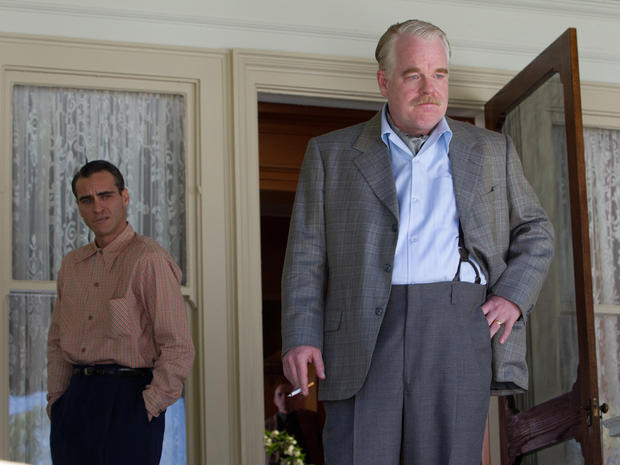"Master" class with director Paul Thomas Anderson
(CBS News) Moviegoers and critics have been passionate in their discussions of the new film "The Master," which was inspired by the genesis of the Scientology movement.
The film, which stars Philip Seymour Hoffman as the L. Ron Hubbard-like leader of a cult and Joaquin Phoenix as a disturbed WWII veteran drawn to his teachings, has sparked passionate debates both by those who love the film - and those who do not.
As director Paul Thomas Anderson said on "CBS This Morning," the challenge facing audiences may be the characters.
"We loved it! We put it out, we thought for sure everybody would go for it," Anderson told Charlie Rose. "We had this kind of a wave of people really digging it, and then this wave that came around saying, 'What is going on here?'"
"Probably has a lot to do with the characters - there's something about the character that Phil plays that's a little bit unknowable, somebody who's kind of proposing to have the secret to the universe. He's kind of hard to get to know. Maybe that rubs in with the film.
"By the end of the film, nobody has an epiphany. They go through a lot, but they don't really get to something that they figure out. They start the same, and they end the same."
The film begins with Phoenix returning from the Pacific theater of World War II, clearly damaged by his experience and having difficulty re-entering civilian life. "There was a great documentary John Huston made called 'Let There Be Light,' about veterans coming back from the war, and just how helpless everybody was at that time to deal with that," Anderson told Gayle King. "And around that time there was a lot of kind of talk that was brewing up about past lives, and movements like Dianetics started, which was an investigation of that. You found a lot of veterans being drawn to that idea and wondering, 'Where did all the bodies go?'"
- Edelstein: "The Master" nails it
- "The Master" wins acting, director prizes at Venice
- Anderson: "The Master" inspired by Scientology founder L. Ron Hubbard
Anderson, whose previous films include "Boogie Nights," "Magnolia," and "There Will Be Blood," said "The Master," which has been called "the Scientology movie," is loosely inspired by Hubbard. "Scientology became something much different and larger [after 'Dianetics']. But, yeah, for sure. The starting point was investigating what that movement was and how it began."
When asked what his conclusions are about the Church of Scientology, Anderson said, "I probably thought about it initially how everybody thought about it - that it was kind of peculiar and I wasn't sure what it was. Now I think it's no more peculiar or weirder than anything else out there. I think it's helped a lot of people. I don't know a lot about it. It works - whatever it does for them, it works."
When discussing Hoffman, Anderson said working with the actor was like "having the keys to a good car. He was full of life and energy and fun and the life of the party. But I've done films with him where it's not all laughs."
The film, which the Weinstein Company had released (in 70mm in many theaters), is backed by Harvey Weinstein, whom Anderson described as "a bull in a china shop, but he's YOUR bull."
Prior to the release of "The Master," Anderson said he had shown the film to Tom Cruise (whom he had directed in "Magnolia" and who is probably the best-known adherent of Scientology). And his reaction? "It was a good reaction. I had a healthy discussion with him."
Anderson, who was a friend of director Robert Altman ("Nashville," "Short Cuts") and whose "Magnolia" could be described as "Altmanesque," was also asked what was the most important thing he had learned from his mentor.
"How to giggle and give in," he replied.
To view the interview with Paul Thomas Anderson click on the video player above.
